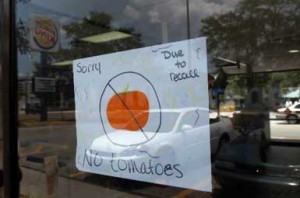Summer 2008 was adventurous for us: Amy was pregnant, we were in Quebec, and I was handling endless media calls about Salmonella in tomatoes that sickened at least 851 people in the U.S., including a sorta creepy middle-of-the-night chat fest for some radio station.
 Turns out it was probably jalapeño peppers.
Turns out it was probably jalapeño peppers.
Tomato growers lost millions and decided to sue the U.S. government for going public prematurely.
Growers and others would be better served if there were clear, publicly available guidelines for when to go public about foodborne illness.
As reported by Michael Doyle of the Fresno Bee, a federal court has rejected the potentially far-reaching claims of Florida tomato growers who say they lost business because of Food and Drug Administration warnings.
The ruling unsettles numerous growers, who collectively lost several hundred million dollars following FDA food safety warnings in 2008 that proved erroneous. The ruling also curtails other growers tempted to base similar challenges on the constitutional requirement that the government pay compensation for taking property.
 “Advisory pronouncements, even those with significant financial impact on the marketplace, are not enough to effect a taking of property under the Fifth Amendment,” U.S. Court of Federal Claims Senior Judge Lynn J. Bush stated.
“Advisory pronouncements, even those with significant financial impact on the marketplace, are not enough to effect a taking of property under the Fifth Amendment,” U.S. Court of Federal Claims Senior Judge Lynn J. Bush stated.
In a 13-page decision quietly issued Thursday, Bush concluded that “although a wide range of government actions may give rise to regulatory takings,” these actions do not extend to “press releases and consumer advisories, by themselves.”
The Tallahassee, Fla.-based attorney representing the growers, M. Stephen Turner, said in an interview Friday that he will appeal. He likened the government’s actions to somebody who “stands in front of a house and says it’s infested with vermin,” thereby destroying property value.
The FDA had responded to an outbreak of salmonella-related illnesses in 2008, issuing warnings on June 3 and June 7 of that year linking the outbreak to certain types of tomatoes. The FDA also held a media briefing on June 13, opining that the “vast majority” of salmonella-tainted tomatoes was “very likely” from New Mexico and Florida.
Four days later, having concluded the disease outbreak was actually linked to imported serrano and jalapeno peppers, the FDA lifted its warning against tomatoes. In the meantime, though, “all or almost all of the value of plaintiffs’ perishable tomatoes was destroyed by the collapse in the market for tomatoes triggered by the FDA’s warnings,” Bush noted.
 The price of Georgia tomatoes in 2008 dropped to less than $4 per box from the usual $18 to $19, while some Florida growers were reportedly reduced to selling their crop for less than $1 per box.
The price of Georgia tomatoes in 2008 dropped to less than $4 per box from the usual $18 to $19, while some Florida growers were reportedly reduced to selling their crop for less than $1 per box.
